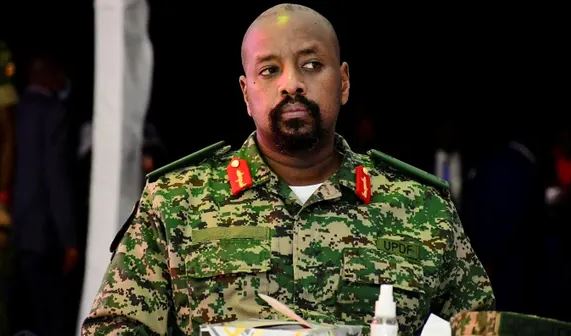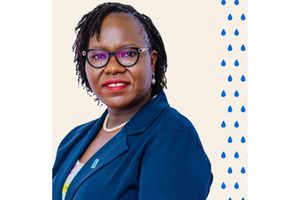Museveni defends son on political comments

Gen Muhoozi Kainerugaba
What you need to know:
President Museveni says "not every matter needs action or punishment’’, but indicates that his government is concentrating on more pressing issues and not matters of the next election.
President Museveni has said senior military officers, including his son Gen. Muhoozi Kainerugaba, will not be punished for publicly making political statements and instead be “guided” – a departure from the past where officers were court-martialed for such commentary.
He repeated his June 2022 caution to the First Son not to discuss political, security and foreign policy matters on social media and instead focus on popularising sports, culture and youth mobilisation for talent harnessing and wealth creation.
Muhoozi, a serving general of the UPDF whose code of conduct debars active-duty personnel from partisan politics, has continued to engage his 653,000-plus followers on Twitter on wide-ranging subjects, including proclaiming that he does not believe in the ruling National Resistance Movement (NRM) party that his father chairs.
On December 13, he declared democracy, which he branded a western liberal idea, a “fallacy” and noted that what is critical is “revolution and the people’s interests”, days after he declared in a later deleted tweet that journalists are “terrorists”, singling out those working with this newspaper.
In an interview with this newspaper in the United States capital, Washington D.C, the President in answer to whether action would be taken against his son and other senior military officers involved in partisan politics, said: “These are small matters. Not every matter needs action or punishment. No. Like there was a big rally [youth meeting] at Kololo [Ceremonial Grounds] where I was invited to talk about wealth creation and some of the people were talking about these elections of 2026. I guided them [that] the time for the election will come, for now concentrate on wealth creation.”
He added: “We don’t have to arrest people. We guide. We have many issues, let’s concentrate on them. Time for the election will come.”
Gen Museveni’s failure to condemn the political talk by serving UPDF officer and proclamation to instead “guide” them is a departure from practice in the past where, for example, now Lt. Gen. Henry Tumukunde, among other officers, was court-martialed for making statement in a radio talk show perceived political.
Article 208 (2) of the Constitution and Section 3(a) of the UPDF Act 2005 provide that the UPDF “shall be non-partisan, national in character, patriotic, professional”, raising questions why officers who digress from the law go unsanctioned.
In the interview held last week, Gen Museveni said he was “not aware” that his son had threatened to “crush” journalists he christened “terrorists”, and instead he agreed that some journalists are terrorists, citing some he accused, without evidence, of sharing video with al Qaeda global terror network.
Asked how Uganda benefited from the US-Africa Leaders’ Summit, which he was in Washington D.C to attend, the Ugandan leader said the country’s intention was to get more investments, consolidate trade access, woo tourists, and engage on ways to bolster security.
He singled out a breakthrough where, during a side event, investors announced that they expect a Final Investment Decision (FID) on the planned refinery by next year, closing the upstream and downstream ends of Uganda’s nascent oil sector.
Gen. Museveni, in response to comments that the United States government may have warmed up to him now but declined to endorse his 2021 re-election on allegations that the vote was violent and rigged, said he was in power with support and by the will of Uganda voters, and not Americans or any foreigners.
“If they are misinformed, that’s their problem” he said, “But for us we are following our Constitution.”
The run-up to the 2021 election was blighted by violence that erupted when National Unity Platform (NUP) party presidential flag bearer Robert Kyagulanyi, alias Bobi Wine, was arrested in November 2020 while on a campaign trail in the eastern Luuka District.
Security forces shot 54 civilians dead while suppressing the resultant protests, according to the government, and the President who previously questioned the logic of killing by “stray bullets” without identified original targets, in our interview returned to explain what Uganda Law Society at the time called “extra-judicial killings” away as a result of mistakes by panicked security personnel.
“There were some mistakes where people were hit with stray bullets different from the rioters who were shot when they were attacking other people”, he said, “The stray bullets were by security [personnel] who were panicking, but all those are being trained and guided on what to do.”
He said nothing about accountability for the lost lives, a central demand of the Opposition, rights groups and some foreign governments, despite findings of police inquiries exclusively serialised by this newspaper establishing that only 13 of the officially acknowledged 54 civilians shot dead in the November riots had anything to do with the disturbances.
In December 2021, the UPDF First Division Court Martial sentenced L/Cpl Augustine Mugisha and another soldier at the rank of private to life imprisonment for killing a Local Defence Unit member, Hussein Ssegona, and mechanic Grace Walungama in Nansana Municipality, Wakiso District.
Since then, there have been no additional trials of suspected shooters, many allegedly drawn from the army’s elite group.
Asked about local and international concerns over democratic deficit in Uganda and rising rights abuses perpetrated by state security agencies and marked by abductions and disappearances of citizens, President Museveni said “there were arrests and all of the people who were arrested were accounted for”.
“There were some mistakes [of] mishandling people while they were being arrested, but we corrected those mistakes. We showed the security forces what to do in writing. So, there is nothing that can go wrong and we don’t know and then we don’t correct,” he said.
The Uganda Human Rights Commission, the statutory rights body, is currently investigating claims by NUP that two dozen of its party members are missing after being forcibly taken away by security forces in drones/vans named so for its speed.
The President in the interview said he would like Ugandans to remember him and the ruling party for rescuing country from being a “failed state” when he is gone.




